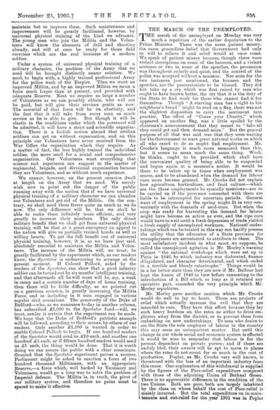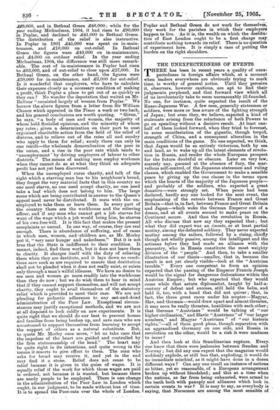T HE march of the unemployed on Monday was very much
a repetition of the earlier deputation to the Prime Minister. There was the same patient misery, the same groundless belief that Government had only to will to relieve it and relief would at once come. We speak of patient misery because, though there were violent inscriptions on some of the banners, and a violent sentence or two in some of the speeches, the procession was throughout orderly and quiet, and the control of the police was accepted without a murmur. Nor even for the two instances just mentioned, the banners and the speeches, are the processionists to be blamed. They did but take up a cry which was first raised by men who ought to have known better, the cry that it is the duty of the State to find work for those who cannot find it for themselves. Though "A starving man has a right to his neighbour's bread" might be read on a flag, there was not the slightest disposition to carry the sentiment into practice. The effect of "Curse your Charity," which appeared on another flag, was a little spoiled by the chairman's announcement that they meant to "take all they could get and then demand more." But the general purpose of all that was said was that they were waiting for the Government to start great national works on which all who cared to do so might find employment. Mr. Crooks's language is much more measured than this, but it seems to mean much the same thing. Work; he thinks, ought to be provided which shall have the convenient quality of being able to be suspended and begun again at a moment's notice. It would be there to be taken up in times when employment was scarce, and to be abandoned when the demand for labour once more became general. Mr. Crooks did not explain how agriculture, horticulture, and fruit culture—which are the three employments he specially mentions—are to be carried on if the processes connected with them are liable to be interrupted for uncertain periods. General want of employment in the spring might fit in very con- veniently with the demands of seed-time. But when the crop was ready for harvesting the demand for labour might have become as active as ever, and the ripe corn- would have to wait until a fresh depression of trade yielded a fresh supply of unemployed workmen. National under- takings which can be treated in this way can hardly possess the utility that the advocates of a State provision for unemployment are accustomed to attribute to them. The most satisfactory incident in what must, we suppose, be called the unemployed agitation is Mr. Morley's warning against "the national workshops which were set up in Paris in 1848, by which industry was dislocated, finance dilapidated, and character deteriorated, and which ended in a terrible and bloody catastrophe." Things would be in a far better state than they are now if Mr. Balfour had kept the lesson of 1848 in view before consenting to the introduction of a Bill which, so long as it retained any operative part, conceded the very principle which Mr. Morley repudiates.
Mr. Morley gave another caution which Mr. Crooks would do well to lay to heart. There are projects of relief which actually increase the evil that they are intended to cure. They have this effect because they lay such heavy burdens on the rates as either to drive em- ployers away from the district, or to prevent them from' embarking on new undertakings. To men who desire to see the State the sole employer of labour in the country this may seem an unimportant matter. But until this change in our whole social and economic system is effected it would be wise to remember that labour is for the present dependent on private purses ; and if these are unduly bled, their owners will be apt to move to places where the rates do not count for so much in the cost of production. Poplar, as Mr. Crooks very well knows, is threatened with the loss of an important industry from this cause. One explanation of this withdrawal is supplied by the figures of the Poor-relief expenditure compared' with those of the adjoining Union of Bethnal Green.' There is no appreciable difference in the condition of the two Unions. Both are poor, both are largely inhabited by the class on whose behalf the cost of Poor-relief is mainly incurred. But the total expenditure on in-main- tenance and out-relief for the year 1901 was in Poplar R43,000, and in Bethnal Green £46,000; while for the year ending Michaelmas, 1904, it had risen to £90,000 an Poplar, and declined to £41,000 in Bethnal Green. The distribution of the relief is also instructive. In Poplar in 1901 £45,000 was spent on in-main- tenance, and £16,000 on out-relief. In Bethnal Green the figures were £43,000 on in-maintenance, and £4,000 on outdoor relief. In the year ending Michaelmas, 1904, the difference was still more remark- able. The cost of in-maintenance in Poplar had risen to £63,000, and of out-relief to close upon £27,000. In Bethnal Green, on the other hand, the figures were .238,000 for in-maintenance, and £3,000 for out.relief. Is it wonderful that employers, who have to calculate their expenses closely as a necessary condition of making a profit, think Poplar a place to get out of as quickly as they can ? No wonder the deputation that waited on Mr. Balfour "consisted largely of women from Poplar." We borrow the above figures from a letter from Sir William Chance which appeared in the Times a week or two back, and his general conclusions are worth quoting. "Given," he says, "a body of men and women, the majority of whom hold Socialist opinions, and the minority of whom pay rates ; given a determination on their part to oust organised charitable action from the field of the relief of distress, and to relieve out of the rates all and sundry who apply to them for relief ; surely there can only be one result—the wholesale demoralisation of the poor in the union, and a rise in the poor rate which tends to 'unemployment' by driving employers of labour to other districts.' The ,means of making men employ workmen when they cannot do so at what they think an adequate profit has not yet been discovered.
When the unemployed curse charity, and talk of the right which a starving man has to his neighbour's bread, they forget the very material facts that in this country no one need starve, no one need accept charity, no one need take a loaf which does not belong to him. The large sums which are being contributed in answer to the Queen's appeal need never be distributed. It rests with the un- employed to take them or leave them. In every part of the country there are the workhouse and the relieving officer, and if any man who cannot get a job starves for want of the wage which a job would bring him, he starves of his own free will. It is this fact that makes the present complaints so unreal. In one way, of course, they are real enough. There is abundance of suffering, and of cases in which men, women, and children are, as Mr. Morley put it, "very near hunger and nakedness." But it is not true that the State is indifferent to their condition. It cannot, indeed, find them work, but it does not leave them to charity. It charges itself with the duty of relieving them when they are destitute, and it lays down no condi- tions save such as are required to ensure that destitution shall not be pleaded when it does not really exist, or exists only through a man's wilful idleness. We have no desire to see men and women go more readily into the workhouse than they do now ; but we do wish them to bear in mind that if they cannot support themselves, and will not accept charity, they ought to avail themselves of the statutory relief which is provided to meet •their case. We are not pleading for pedantic adherence to any out-and-dried administration of the Poor Law. Exceptional circum- stances may justify exceptional methods, and we are not at all disposed to look coldly on new experiments. It is quite right that we should do our best to prevent homes and families from being broken up, and save men who are accustomed to support themselves from learning to accept the support of others as a natural substitute. But, to quote Mr. Morley once more, "let us take care that the impulses of the heart are. guided and controlled by the firm statesmanship of the head." The heart may be quite right in its intentions, and quite wrong in the means it resorts to give effect to them. The man who asks for bread may receive it, and yet in the end may find it a stone. Relief does not cease to be relief because it is given in the guise of wages. It is equally relief if the work for which those wages are paid is ordered, not because it is wanted, but because there are, needy people to be employed. There is one change in the administration of the Poor Law, in London which ought, in our judgment, to be made without, loss of time. It is to spread the Poor-rate over the whole of London. Poplar and Bethnal Green do not work for themselvei, they work for the parishes in which their employeis happen to live. As it is, the wealth on which the destitit= tion of East London ought to be a first charge may, contribute nothing towards its relief. There is no question of experiment here. It is simply a case of putting the burden on the right shoulders.
• 1.11h 17NEXPECTEDNESS OF EVENTS:





















































 Previous page
Previous page